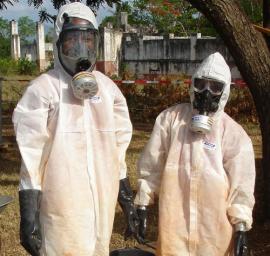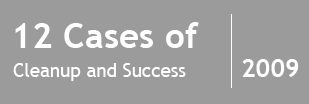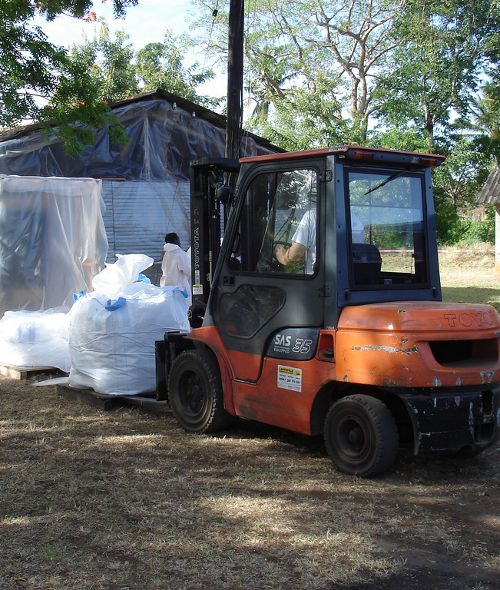Disposing of DDT
Old Korogwe, Tanzania
| Location | Old Korogwe, Tanzania |
|---|---|
| Pollutant | Pesticides DDT and Thiodan |
| Cause | Unsecured stockpile of 100 tons leaching into soil and stream |
| Health Impact | DDT releases a strong odor and damages the nervous system of adult and children. |
| Output | At the request of the government of Tanzania and with support from the African Stockpile Program, the German Technical Cooperation (GTZ) safely removed pesticides from the site and transferred them to Germany for destruction in accordance with international waste transfer regulations. GTZ also trained local personnel in hazardous removal techniques, enhancing Tanzania’s capacity to conduct future clean up operations. |
| Outcome | The GTZ-led operation successfully removed 86 tons of DDT and 20 tons of DDT-contaminated construction material from the dismantled store and shipped them to Germany for incineration while abiding by international safety regulations. |
| Implications | This operation provides a model for international governments and supranational organizations to cooperate in removing toxic chemical stockpiles in developing countries where resources and technology are often missing. |
| Remaining Challenges | Many developing countries experience similar issues of improper toxic storage and disposal, especially that of persistent organic pollutants (POPs). These cases are often unknown or unreported until years later, directly threatening public health and the surrounding environment. |
Context
The people of the town of Korogwe fetch their daily drinking water, do their washing, fish and go for a swim in the local river. Nearby is a rust-pitted shed containing a 100-ton stockpile of DDT. Every rain shower in this tropical zone flushed the poison into the river [1].
Site Details
Old Korogwe is a mountainous small town approximately 280 km north of the Tanzanian capital, Dar Es Salaam with a population of nearly 10,000. The Old Korogwe pesticide store was located on the site of a former sisal factory and had stored DDT and Thiodan since 1980s. The site was within 80 m of the Pangani River, the only source of drinking water supply in Old Korogwe, and important for the production of rice paddies. Cattle of nearby small farms grazed within proximity of the site. The Micro Credit Bank for Women of Tanzania, a site with frequented by women and children, is adjacent to the pesticide storehouse. Children in the neighborhood also used to play on the extensive site of the storehouse.
Health Impact
DDT is an insecticide that was used in 1940s, mainly as malaria-prevention agent. The production and use of DDT has been banned since the Stockholm Convention went into force in 2004. Once introduced into the human body, DDT accumulates in the system over the long term. According to the WTO, the effects of DDT and its metabolites include premature birth, an elevated risk of breast cancer and damage to the nervous system, liver, kidneys, and immune system of adults and children.
Exposure Pathways
Eating contaminated foods and direct ingestion.
Intervention
The GTZ-led operation successfully removed 86 tons of DDT and 20 tons of DDT-contaminated construction material from the dismantled store and shipped them to Germany for incineration while abiding by international safety regulations [2].
The GTZ Team started the operation by strategically planning the process with input and comments from its project partners. When the team arrived at the site, it prioritized briefing nearby communities on safety issues related to DDT exposure and disposal, in order to evacuate the area during the process. Significantly, the entire process was carried out in accordance with international waste transfer regulations, for example, using UN-approved equipment and procedures. GTZ commissioned a German commercial disposal company, Currenta GmbH, Leverkusen, with the on-site tasks of securing and disposing of chemicals. Currenta also planned the transboundary transfer of collected DDT between Germany and Tanzania. Following the removal of DDT from the site, the pesticide store was demolished. The collected toxic waste was shipped to Dormagen, Germany based on OECD safety standards.
GTZ also worked closely with the Tanzanian National Environment Management Council (NEMC), and trained three employees from the Council as chemical waste disposal specialists. As a result, the NEMC now has local expertise to handle future disposal initiatives in the country under the World Bank’s Africa Stockpiles Program (ASP) [3].
Implementing Organizations
The National Environmental Management Council (NEMC) of Tanzania, German Technical Cooperation (GTZ), the African Stockpile Programme (ASP) of the World Bank and Food and Agriculture Organization (FAO), and Currenta GmbH, Leverkusen (German commercial disposal company).
Remaining Challenges
As of February 2008, there were still 350 stockpiles in Tanzania with an estimated 1,500 tons of obsolete pesticides yet to be cleaned up by the ASP [4].Unreported toxic storage cases like the Old Korogwe pesticide store are common in developing countries, where knowledge level of harmful pollutants are relatively low. These cases are often unknown or unreported until years later, directly threatening public health and surrounding environment. Furthermore, cases in which local governing agencies and public interest groups are aware of a public health sometimes lack resources for remediation and disposal.
In May 2009, the UN and WHO announced a plan to support a global phase-out of DDT by 2020 [5].
References
GTZ. Tanzania: environmentally sound disposal of DDT waste. German Technical Cooperation. 22 Feb. 2008. 5 Oct. 2009.
→ http://www.gtz.de/en/themen/laendliche-entwicklung/22822.htm
Schimpf, Wolfgang A. Environmentally Sound Disposal of DDT-An Example From Tanzania. German Technical Cooperation. Sep 2009.
Hotspot report for a Contaminated Site: Old Korogwe DDT Site in Tanzania; AGENDA for Environment and Responsible Development (AGENDA); Dar Es Salaam, Tanzania; May 2005
Additional Photos
|
|
| Working in the intermediate zone |
Footnotes
[1] GTZ. Tanzania: environmentally sound disposal of DDT waste. German Technical Cooperation. 22 Feb. 2008. 5 Oct. 2009.
→ http://www.gtz.de/en/themen/laendliche-entwicklung/22822.htm
[2] Schimpf, Wolfgang A. Environmentally Sound Disposal of DDT-An Example From Tanzania. German Technical Cooperation. Sep 2009.
[3] GTZ. Tanzania: environmentally sound disposal of DDT waste. German Technical Cooperation. 22 Feb. 2008. 5 Oct. 2009.→ http://www.gtz.de/en/themen/laendliche-entwicklung/22822.htm
[4] GTZ, 2008.
[5] Reuters. U.N. seeks to ban DDT pesticide and still fight malaria. Wed May 6, 2009.

-
Phasing Out Leaded Gasoline
-
Ending Chemical Weapons
-
Improving Indoor Air - Ghana
-
Preventing Mining Pollution - Chile
-
Lowering Radioactivity - Chernobyl
-
Cleaning Urban Air - India
-
Removing Lead - Dom. Republic
-
Recapturing Mercury - Indonesia
-
Reducing Lead - Russia
-
Removing DDT - Tanzania
-
Restoring a Waterway - China
-
Removing Arsenic - India




